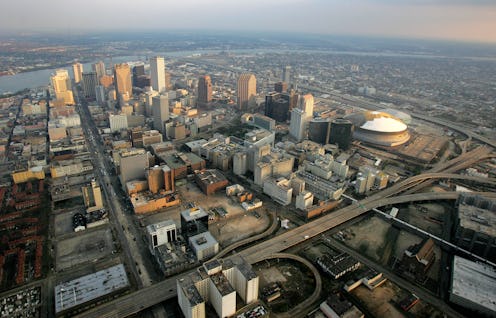
Amidst a rise in climate change-driven weather disturbances across the globe, Louisiana and other states along the Gulf of Mexico are bracing for the brewing Tropical Storm Barry. Thunderstorms and rain have already been battering New Orleans, putting certain areas under a reported 3-4 feet of water. As Tropical Storm Barry approaches, those conditions could become even worse, so if you're wondering how to help New Orleans as the flooding continues, there are a few important points to keep in mind.
In 2005, Hurricane Katrina collapsed the city’s flood protection system, burying over 80% of the city in water. In the aftermath of Katrina, activists argued that relief efforts prioritized mostly white areas, despite millions of dollars being raised to presumably help all of the city's communities. According to NBC News, Red Cross chief diversity officer Rick Pogue explained that while the organization intended to help everyone who was impacted, quickly responding to certain black impoverished communities was more difficult. “The need was so great, we’d go first to the areas we could get to the easiest," he said at the time.
Following the criticism, as well as reports about how the hurricane disproportionately affected communities of color, Katrina Gay of the National Alliance on Mental Illness (NAMI) explained why NAMI's relief efforts succeeded whereas others failed Black communities.
"I will tell you my No. 1 takeaway,” Gay said in a 2015 interview with Mashable.
It's the community. It's the community that's going to make it happen, and it's the people who live and love and work and know that community who are going to be part of making it happen. If you're a federal agency, you better have relationships in those states. If you don't, you're going to be at a disadvantage. You just can't help without that.
So as these floods and a potential hurricane set into the region, ensuring that relief efforts prioritize supporting local communities is crucial if you want to lend a hand.
Where To Donate Money
Access Health Louisiana and Direct Relief are working together to provide emergency medical kits and Hurricane Prep Packs, over 200 of which are stationed across Louisiana for easy-access and use. The medical and other storm-essential goods will need to be replenished in the event that Hurricane Barry increases in intensity. You can donate to Direct Relief here.
New Orleans’ Baptist Community Health Services is currently sorting medications ahead of the storm and packing medical go-bags, all while checking in with current patients to make sure they have access to necessary medications and reliable transportation. You can donate to the group here.
Common Ground Relief is a community-initiated, volunteer-run organization formed in the aftermath of Katrina. According to its website, in the years immediately following Katrina, they worked on “providing housing, health, clothing, pro bono legal services, and other core needs to the residents of New Orleans.” The organization continues to evolve its mission as needed, and will doubtless be crucial to relief efforts in the upcoming storms. You can find out more about volunteering for Common Ground Relief here.
During Hurricane Katrina, NAMI mobilized its local affiliates and HelpLine to ensure that hurricane survivors with psychiatric conditions could access shelters, safety, and support. The traumatizing nature of these storms makes NAMI’s work in the region even more essential. You can learn more about donating to NAMI New Orleans here and about becoming more involved here. Additionally, the group's website provides a Crisis Line phone number: 1-800-273-8255.
The Coalition To Restore Coastal Louisiana (CRCL) is a research organization whose efforts will be vital months after the storm. In the aftermath of Katrina, CRCL used its knowledge of local community networks to serve as a clearinghouse for directing volunteers to the most vulnerable city regions, figuring out what people needed and where, and getting resources and information to the right people at the right times. You can donate and become a member of CRCL here.
Where To Donate Goods & Volunteer
The American Red Cross is packing nearly 2,000 kits full of coats, blankets, and other essentials to be delivered to Louisiana and southeast Texas. Additionally, they are looking for more volunteers to help take photos, sort through warehouse goods, and distribute food, according to a Houston ABC affiliate. You can donate to the American Red Cross of Louisiana here or find out more about volunteering here.
Remember That Communication Is Key
The American Red Cross took several lessons from Katrina, one of them being the need for families and friends to reach out and let each other know that they’re safe. So it set up a Safe And Well website that allows people to list themselves as safe in the aftermath of a disaster. You can promote the website on social media if you want to spread the word or let any friends and family in the area know.
Don't Forget That Detention Centers Could Be In The Storm’s Path
So far, Houston and other coastal Texas regions seem out of Tropical Storm Barry’s path. However, these weather formations can often be unpredictable and change course unexpectedly. With this in mind, it's important to consider the safety of migrants being held in conditions that have already been criticized as inhumane.
Calling your representatives and getting involved in other immigrant advocacy efforts can help protect migrants, especially in the face of the oncoming storm.
As the tropical storm approaches land, you can keep track of which areas will be impacted the most, and develop a plan of action in advance. And if you want to help communities affected by the storm, you have lots of options.